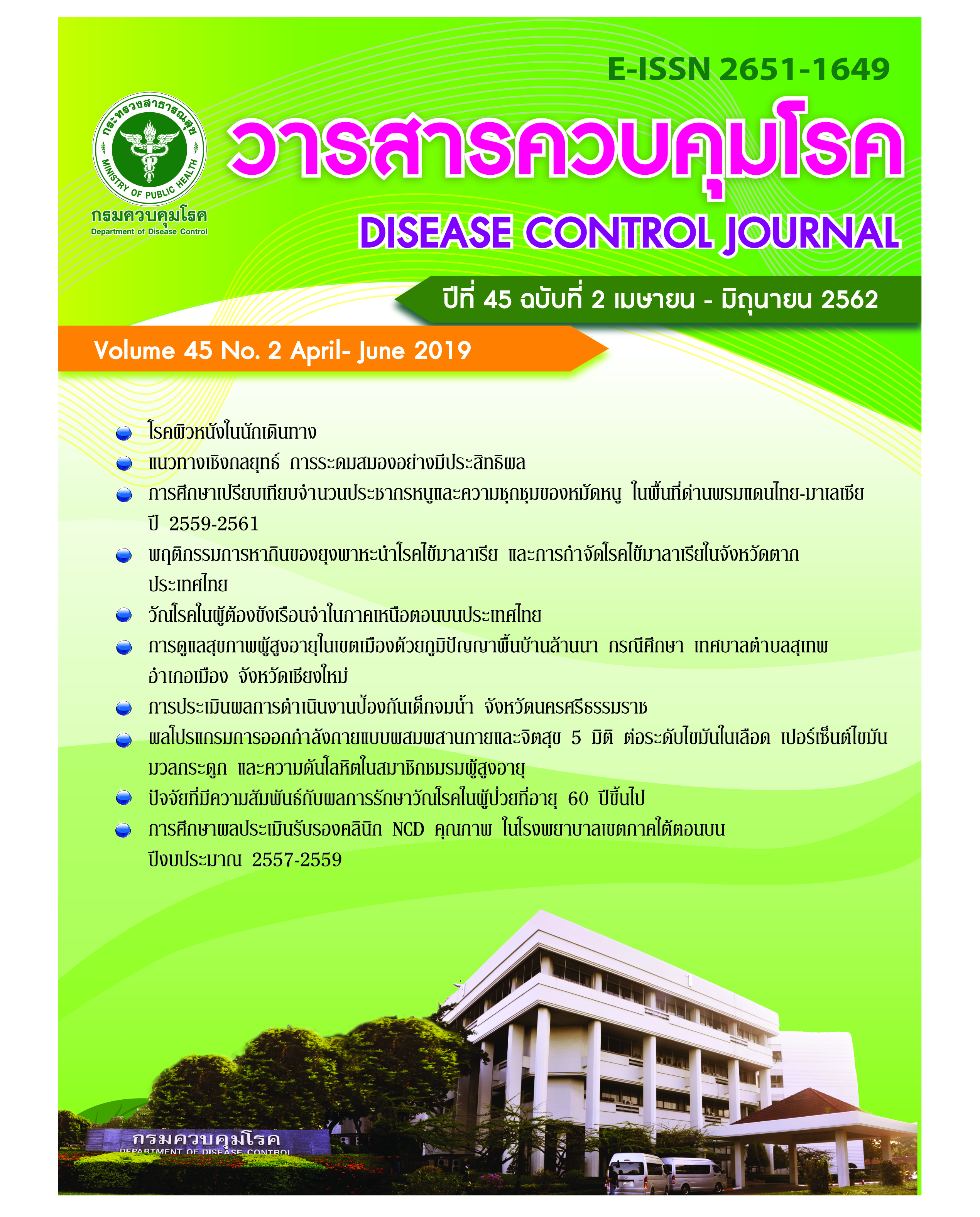The study of quality assurance of the NCD (non-communicable disease) clinics of the hospitals in the upper south in fiscal year 2014-2016
DOI:
https://doi.org/10.14456/dcj.2019.10Keywords:
NCD Quality Clinic, Hospitals in the Upper Southern Region, Health Zone 11, regional hospital, general hospital, community hospitalAbstract
The study of quality assurance of the NCD (non-communicable disease) Clinics of the hospitals in the upper south region was conducted during the fiscal year 2014-2016. This cross-sectional explanatory study aimed to compare the results of self-assessment scores with the results of assessment performed by Health Zone 11 assessment team as part of quality assurance program, as well as problems and success factors using questionnaires and interviews. The target groups are regional hospital (level A), general hospital (S, M) and community hospital (F1-F3) in the upper south region of Thailand. Study methods included self-assessment by participating hospitals and assessments performed by Health Zone 11 assessment team according to the NCD Quality Clinical Criteria. Regional hospitals (level A) were assessed in 2014 and in 2014, 2015, and 2016 community hospitals (F1-F3) were randomly evaluated at the coverage rate of 30, 40, and 30 percent, respectively. Data was analyzed using descriptive statistics including frequency, percentage, mean, and standard deviation. Inferential statistics was also utilized, which included independent sample t-test and Mann-Whitney U test using SPSS software platform. Qualitative analysis involving content analysis was utilized to analyze each component of the six criteria for quality NCD clinic. Additionally, gap analysis was performed to identify areas of improvement and development of the NCD Quality Clinics. Findings from this study indicated that most hospitals under the F1, F2, F3, M1, M2 categories have achieved excellent scores. In the meantime, level A and S hospitals have largely obtained a very good rating as well. Comparison of mean scores between self-assessment and clinical assessment of NCD quality assurance program in fiscal year 2014-2016 found statistically significant difference in p<0.01. Regarding the problems and obstacles, it was found that even though most health care workers responsible for chronic non-communicable diseases (NCDs) have had proper understanding of the guidelines and assessment criteria, there remain some issues that may not be mutually understood in the same way with the appraiser. Findings from this study suggested that successful implementation of the program relied primarily on the commitment of the leadership of health facilities to the quality NCD clinic operations. Senior management of both internal and external health agencies that are members of quality NCD clinic network would have to ensure that their clinical operations are closely linked with those of the quality NCD clinic program. It was recommended that networks of quality NCD clinic be established at all levels, as well as encouraging sharing and exchange of knowledge and experience to ensure close collaboration to adequately address the threat from NCDs. In addition, a working group or task force with clearly-defined mandate and roles and responsibilities will need to be appointed to ensure a concerted efforts to address NCD problems at the provincial, regional, and national levels.
Downloads
References
2. Institution of Medical Research and Technology Assessment, Department of Medical Services. Literature Review: the current situation and care model of non-communicable diseases. Bangkok: Art Qualified; 2014. (in Thai)
3. Bureau of Non-Communicable Diseases, Ministry of Public Health. Guidelines for provision of integrated health services for working-age population. Bangkok: The War Veterans Organization of Thailand Under Royal Patronage of His Majesty the King; 2015. (in Thai)
4. Bureau of Non-Communicable Diseases. Ministry of Public Health. Guidelines for performance assessment of quality NCD clinics, Fiscal Year 2015. Nonthaburi: Bureau of Non-Communicable Diseases; 2015. (in Thai)
5. Potisat S, Hiranratanatham J. Guidelines for the development of treatment and care and management system for non-communicable diseases (NCDs). Bangkok: Partnership Udomrat Publish and Design; n.d. (in Thai)
6. Improving Chronic Illness Care MacColl Center for Health Care. The Chronic Care Model [Internet]. [cited 2019 Nov19]. Available from: https://www.improvingchroniccare.org/index.php?p=The_Chronic_Care_Model&s=2
7. The Healthcare Accreditation Institute (Public Organization). District Health System Accreditation. Nonthaburi: The Healthcare Accreditation Institute (Public Organization); 2017. (in Thai)
8. Sadtrakulwatana V. The development of a chronic diseases clinic model (diabetes, hypertension) in primary health care units, Mueang District, Sing Buri Province. Journal of Preventive Medicine Association of Thailand [Internet]. 2018 [cited 2018 Jan 9];8:24-36. Available from: https://tci-thaijo.org/index.php/JPMAT/article/download/126373/95512/ (in Thai)
9. Naiyapatana A, Sripairoj N, Srikeaw D, Srikate N. Developing a performance evaluation system for staff members of Faculty of Education, Srinakharinwirot University (SWU): using the individual key performance indicator approach. Srinakharinwirot Research and Development Journal of Humanities and Social Sciences [Internet]. 2015 [cited 2018 Jan 19];7:182-97. Available from: https://ejournals.swu.ac.th/index.php/swurd/article/view/7429/6832 (in Thai)
10. Vaisurasingha L, Chudjuajeen S, Wuttisukpaisan S. The development of performance appraisal model based on result-based management. Journal of Nursing and Education [Internet]. 2012 [cited 2018 Jan 19];5:37-54. Available from: https://www.tci-thaijo.org/index.php/JNAE/article/view/8824/7523 (in Thai)
11. Kitpreedaborisut B. Research articles: measurement and evaluation. 2nd ed. Bangkok: Sriananta printing; 2000. (in Thai)
12. Kanjanawasi S. Theoretical assessment. 3rd ed. Bangkok: Chulalongkorn University; 2012. (in Thai)
Downloads
Published
How to Cite
Issue
Section
License
Articles published in the Disease Control Journal are considered as academic work, research or analysis of the personal opinion of the authors, not the opinion of the Thailand Department of Disease Control or editorial team. The authors must be responsible for their articles.






